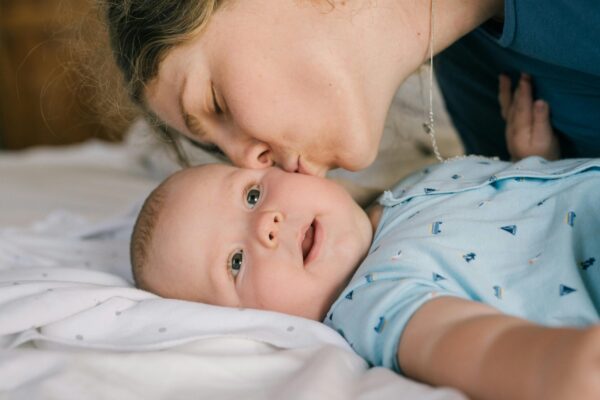When sleep training doesn’t work, it can feel discouraging, confusing, and even a little defeating. You’ve followed the plan, set up the sleep environment, and put in the effort—and yet your baby still isn’t sleeping longer stretches.
If that’s you, take a deep breath: this doesn’t mean you’ve failed. It usually means there’s an underlying factor that needs to be addressed before sleep training can “stick.”
As I often remind parents: “If we’re doing everything right and it’s not working, something else is in the way.”
Practical Steps to Take if Sleep Training Isn’t Working
Support for Parents Who Feel Stuck

Possible Medical Issues
Before assuming your baby “just isn’t a good sleeper,” we need to rule out medical challenges that can interfere with rest. Babies don’t wake up ten times a night to spite you—something is making them uncomfortable.
Some of the most common medical culprits are:
- Reflux: Babies with reflux struggle lying flat, often preferring to be held upright.
- Lip or tongue ties: Lip/tongue ties can cause inefficient feeding, leading to gassiness and frequent waking.
- Allergies or sensitivities: Tummy upset from cow’s milk protein intolerance or sensitive formulas can prevent solid stretches.
Sensory needs: Some babies need more sensory input (movement, touch, deep pressure) to feel safe enough to sleep.
If you’re hitting a wall and wondering when sleep training doesn’t work, this is often the first place to look. A pediatrician, feeding therapist, or specialist can help uncover and address these hidden challenges.

Temperament Factors
Not all babies are wired the same way. Some are laid-back and quickly learn to self-soothe, while others are more intense and persistent.
Temperament affects sleep training in a big way:
- High persistence: These babies escalate quickly and don’t wind down without a lot of support.
- Low adaptability: They resist transitions and changes, making routines harder to establish.
- High sensitivity: Every creak, shift, or change in temperature can rouse them.
If you’re wondering why sleep training doesn’t work for your baby, temperament may be a big piece of the puzzle. That’s why in our 4-24 months course, I show you how to adjust methods to match your child’s unique personality.
When to Pause and Reassess
There are times when the best move is to step back. If your baby is consistently inconsolable, struggling with reflux, or showing no progress after consistent effort, it’s okay—wise, even—to pause.
Pausing gives you time to:
- Rule out medical factors.
- Focus on feeding, growth, and comfort.
- Use survival strategies like safe contact naps to ensure your baby still gets restorative rest.
Pausing doesn’t mean failure. It means you’re being responsive to what your baby actually needs in the moment. Once the underlying issue is resolved, sleep training can move forward much more smoothly.

Practical Steps to Take if Sleep Training Isn’t Working
So, what do you do when you’ve tried and tried, but baby still isn’t getting it? Here are some troubleshooting steps to consider:
- Evaluate the sleep environment. Is the room dark enough? White noise consistent? Temperature comfortable? Even small tweaks can make a big difference.
- Check feeding. Sleep and feeding are tightly connected. A baby who isn’t getting full feeds during the day may make up for calories overnight. Work with a lactation consultant or feeding specialist if needed.
- Watch wake windows. Overtired babies often struggle the most with sleep training. Keeping age-appropriate wake windows helps reduce meltdowns.
- Adjust expectations. Some babies need a slower, more gradual approach. Instead of “cold turkey,” try layering in support—soothing between intervals, or picking up when needed.
- Get support. When sleep training doesn’t work despite your best efforts, a consultation can bring clarity. Sometimes you need someone to say, “Here’s the missing piece.”
Troubleshooting isn’t about starting over; it’s about fine-tuning until you find what works for your unique baby.
Support for Parents Who Feel Stuck
It’s easy to spiral into guilt and self-blame when sleep training doesn’t work. Please hear this: it’s not because you’re “bad” at this. You’re a great parent, and your baby is a great baby.
Sometimes you just need fresh eyes, a few small tweaks, or a supportive guide to walk you through the process. That’s exactly why I created our courses and guides, and why my team and I offer one-on-one consultations. We’ll help you troubleshoot, adapt, and find what does work for your family.

Recap of When Sleep Training Doesn’t Work
When sleep training doesn’t work, it’s not the end of the story. Sleep is a skill, and like any skill, some babies learn quickly while others need more time and support.
Remember: “If we’re doing everything right and it’s not working, something else is in the way.” With the right tools, the right adjustments, and a little patience, you and your baby will get the sleep you need.
Next step? Explore our sleep courses for step-by-step guidance or book a consultation with The Peaceful Sleeper team. We’ll help you get unstuck and on your way to peaceful nights.

